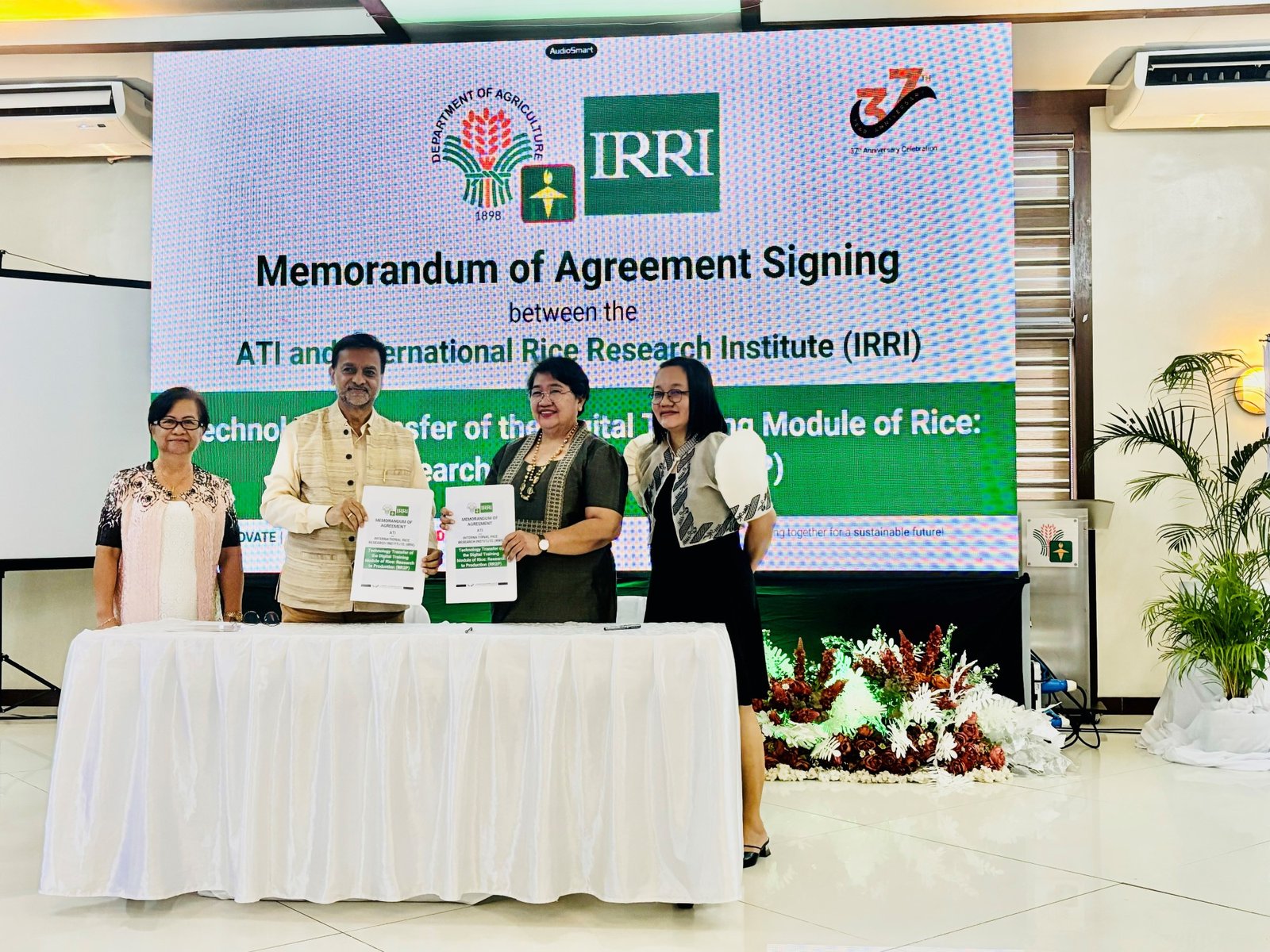Thursday, 19 February 2026

The DA-IRRI SERVE 2 project aims to continually strengthen and sustain the gains in capacity development and partnership in rice science between IRRI and DA.
The International Rice Research Institute (IRRI) and the Philippine Department of Agriculture (DA) signed a Memorandum of Agreement (MoA) for the formal turnover of the Digital Training Module on Rice: Research to Production (RR2P) from IRRI to the DA-Agricultural Training Institute (DA-ATI).
The ceremonial turnover marks the official transitioning of the Rice: Research to Production (RR2P) Online Training Program developed under the DA-IRRI “Strengthening the capability of national research for development and Extension partners for Research and development and Extension of information and technologies to improve productivity, competitiveness, and resilience of rice-based farming communities in the Philippines (DA-IRRI SERVE 2)” Project which ended last October 2023.
The DA-IRRI SERVE 2 project aims to continually strengthen and sustain the gains in capacity development and partnership in rice science between IRRI and DA through work packages that build on the successes and unify the capacity development initiatives of its predecessor projects, SERVE 1 and Enhancing the Research and Development Capacities (Skills, Competencies and Capabilities) and Formulation of the R&D Capacity Development Program of the Regional Rice and Rice-based Research and Development Network (ER4D). The SERVE 2 Project generally aims to provide a platform and enabling mechanisms to the national agricultural research and extension partners (NAREP) from the different DA Regional Field Offices and Attached Agencies, State Universities and Colleges (SUCs), and Local Government Units (LGUs).
Following its development in 2018, the project team implemented the RR2P Online Training Program in 2019 to educate and help build national capacity towards Agriculture 4.0. The program was adapted from the annual 3-week face-to-face RR2P course offered by IRRI’s capacity development arm, IRRI Education. The pilot implementation had a total of 115 completers, where 82 are from SUCs, 32 are from DA Regional Field Offices (DA-RFOs) and Attached Agencies, and 1 from a Local Government Unit (LGU). This was done to ensure that the online learning modules are appropriate for its future target users and gather feedback to further enhance the content and its delivery.
After the pilot run, an improved version of the course utilizing a blended learning approach where participants will have both synchronous and asynchronous 5 to 9-week online training sessions and a 1-week face-to-face session was developed. The face-to-face session served as an integration platform and avenue to readily apply the skills acquired by the training participants and validate the knowledge gained through practical hands-on sessions, field exercises, problem-solving, and formulation of recommendations.
From 2021 to 2023, the DA-IRRI SERVE 2 Project Team was able to implement six (6) online rollouts and two (2) face-to-face RR2P Training. This resulted in 279 online completers where 159 are from DA-RFOs and Attached Agencies, 76 are from SUCs, and 44 are from LGUs. On the other hand, the two face-to-face programs had a total of 114 participants where 72 are from DA-RFOs and attached agencies, 32 are from SUCs, and 10 are from LGUs.
As the capacity builder, knowledge bank, and catalyst of the Philippine Agriculture and Fisheries extension system, the DA-ATI will finalize plans and preparations for the pilot implementation of the course outside of the project to ensure that the program will remain widely used by trained experts and sustained for implementation across the country.
Similar to the course implementation conducted by IRRI Education, the RR2P Course will have asynchronous and synchronous sessions for the online program with a five-day face-to-face component. The tentative implementation date for the online course is May 2024.